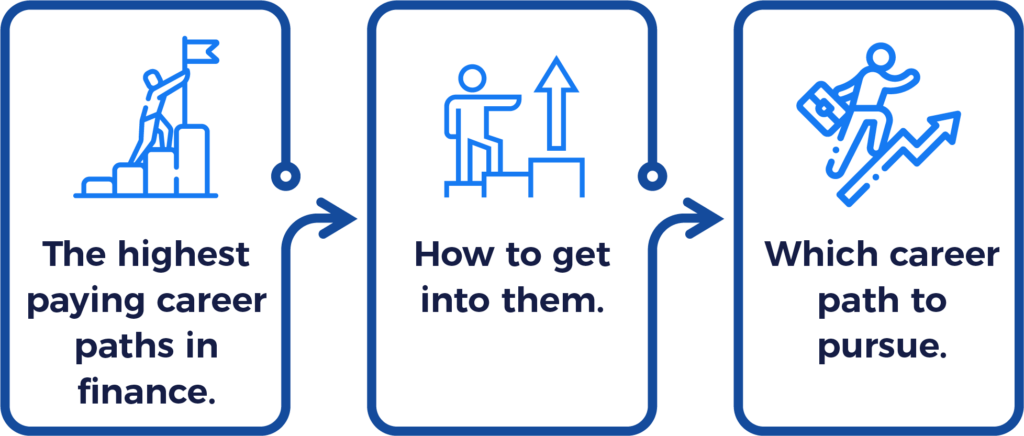
- The highest paying finance jobs.
- How to get into them.
- Which career paths in finance to pursue.
- MOST importantly: I?ll show you why you 1000% need to have some relevant experience ahead of time (whether a Tier 1 internship or our ILTS Analyst Program which gives students & grads that experience) to actually land the jobs
Let?s get started!
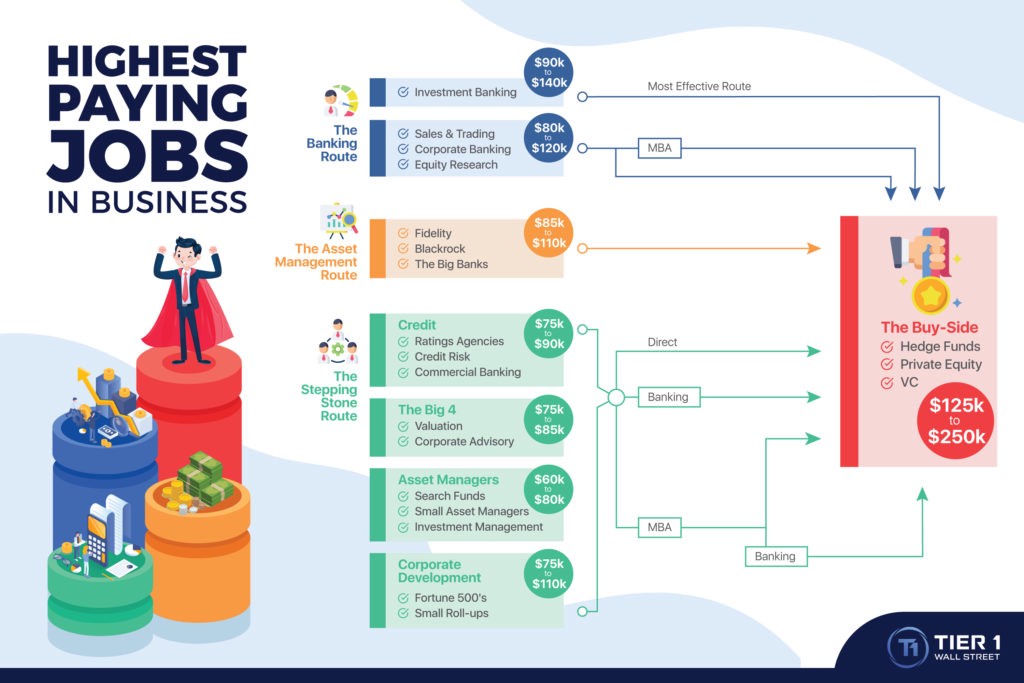

Choose Your Route: The Highest Paying Finance Jobs
If you?re a business or finance major, you probably have your sights set on the Buy Side.
People drool over this career path, and with good reason. That?s where the big bucks are. To get to the buying side as quickly and efficiently as possible, there?s 3 routes you can take ?
- Banking
- Asset management
- Or a stepping stone career path
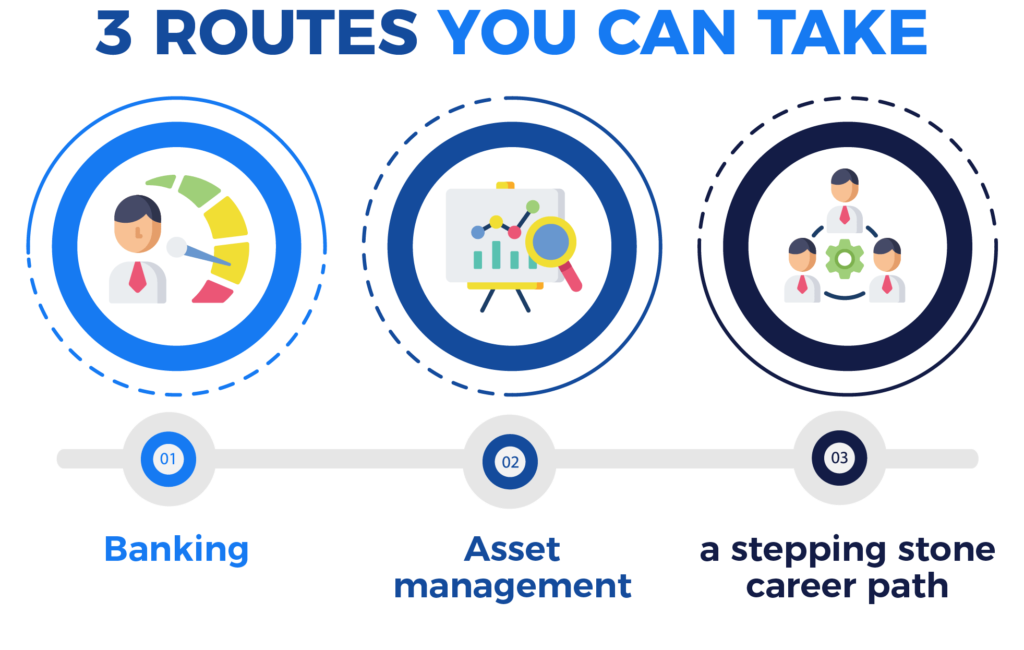
PURSUE TIER 1 JOBS
Whichever route you take, focus on landing a Tier 1 Job.
Tier 1 jobs are generally front office, analytical roles that are both interesting and rewarding. You?re likely working on different deals or even with different companies. You?ll be doing tons of research and honing your communication and problem solving skills along the way.
Tier 1 Jobs are attractive for these four reasons:

- Highest pay in the industry
- Most prestige in the business world
- They can lead to some of the best exit opportunities (jobs with even higher salary)
- You?re doing the best type of work, work that is interesting and will help you grow.
AVOID BACK END JOBS
Do your very best to avoid back-end jobs. At these jobs you?ll plug in numbers all day with Excel or worse, spend hour after grating hour cold calling.
These positions mind numbing and absolutely soul sucking.
But beyond that, they?ll smother your growth and add exactly zero value to your finance career.
Now, don?t get me wrong? I realize some people stay in their roles longer, and may never move on at all. That?s completely okay. Sometimes you find what you enjoy the most along the way.
But if you?re looking for a top position in the financial world, this article?s for you. Let?s start with banking.

Highest Paying Finance Jobs Path 1 ? Banking
First off, we have the general field of banking. This is probably the most lucrative, but also the most competitive. Recruitment starts as early as freshman, sophomore, and junior year. You have to really be on your ?A? game very early on to be successful.
Obviously, the reason for the stiff competition is the money. When you have 22 year olds making between $90K ? $140K straight out of college, you know the requirements will be tough.
So what do you need?
- We?re talking a year of solid experience, whether it?s landing a relevant/analytical type internship, or participating in an experience-based program like our ILTS Analyst Program.
- You also need to have an incredible GPA ? 3.5 and up, and more than likely from a well respected school.
- But good grades and a prestigious Alma Mater usually aren?t enough. You?ll probably need to do some heavy networking to get your foot in the door ? just to land an interview.
Competitive, huh?
Let?s talk about the different types of banking

Investment Banking
First up, we have investment banking. Like I mentioned before, this is probably the most competitive, yet lucrative career path in finance. You?ll be making a lot of money, working a lot of hours. Probably 80?100 hours of work a week. I?ve heard of some people even working 120 hours? Absolutely nuts. The upside? This is easily the most direct route to getting into the buy side.
If you?re working in this field you?ll most likely be working on things such as:
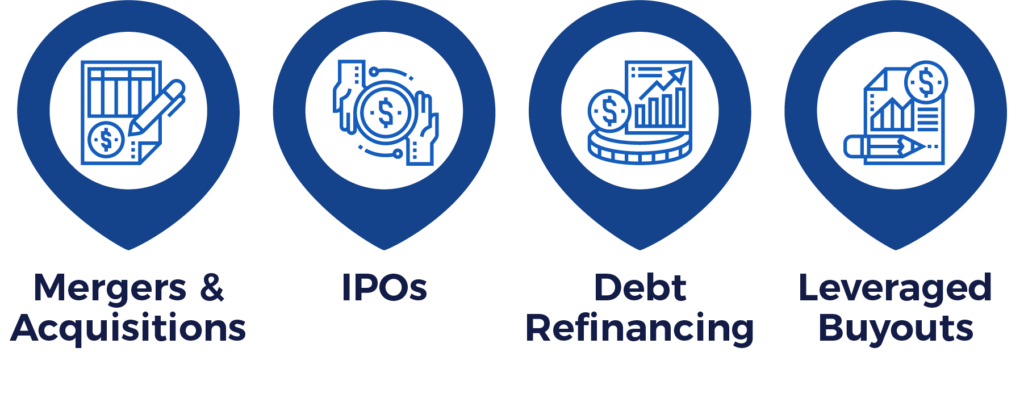
- Mergers & Acquisitions
- IPOs
- Debt Refinancing
- Leveraged Buyouts
Your job as an entry level analyst will primarily be building different models, whether it?s a three-statement company-specific model or a product-based model like an M&A model or LBO model. You?ll also be working on pitch books to go over the details of various deals, depending on what kind of department you?re in.
If you?re in investment banking for about a year or two, you can usually move over to the buy side from there. You can go to a private equity firm, or a hedge fund ? whatever you choose, it?s a lot easier to make the jump to the buy side if you started in investment bank.
Corporate Banking, Sales & Trading, & Equity Research
Ok, so I get that Corporate Banking, Sales and Trading, and Equity Research are very different from one another. But the reason I lumped them together is because the exit opportunities are somewhat similar.
Unlike Investment Banking which is the most ideal opportunity for a smooth transition to the buy side, these fields may require a little more work. You may need to further your education by getting an MBA, or transition into an Investment Banking position after leaving. Let me briefly explain each field:
Corporate Banking: Your primary focus is the credit side of things. In corporate banking, you?re primarily working on more investment grade type products, whether it?s a term loan or a revolver, etc.
You?ll have lower pay, but better hours which may lend to a better lifestyle.

Sales & Trading: Like the name implies, you?ll be selling and trading. It can be really, really intense because your work is in real time. You need to be able to handle a lot of stress to be a good fit.
This also has a better work-life balance as you?re generally working during trading hours.
Equity Research: If you?ve ever scoured the likes of Yahoo Finance or Google Finance you?ve probably come across reports or price targets on various companies. This is the work of equity researchers.
This is a difficult position to land as a newbie, but if you can you?re much more likely to move on to a buy side role.
So, to recap ?
The banking route is probably the best finance career path to go after, but it?s probably only a good idea if you?re still fresh in your college career, and have ample time and resources to prepare yourself for potential recruitment opportunities. Corporate Banking, Sales and Trading, and Equity Research are great options too, but the transition to the buy side won?t be as easy.
Next up ? Asset Management.

Highest Paying Finance Jobs Path 2? Asset Management
Similar to investment banking, entry into this field is going to require a lot of effort and proof on your end. You?ll need to have all your ducks in a row ? experience from an internship or the likes of one, impressive grades, and good connections to those working in the company you?re interested in. Like all fields, networking is very important. Without it, you may never get your foot in the door.
A job in asset management is most likely at a big bank like J.P. Morgan or places like Fidelity and BlackRock. Basically companies that are managing their own assets. Your job will be to research different companies and industries, and doing work with portfolio management.
It?s super interesting work that is incredibly relevant and helpful when you?re eventually seeking a buy side job because you?ll be doing the same shit at a hedge fund, private equity firm, or venture capital firm.
As a perk, the pay is pretty damn good too. You?ll probably be making anywhere between $85K and $110K, fresh out of school! But like the other high paying jobs, there?s a lot of competition.
So, how does asset management stack up against investment banking?
The trickiest part about the asset management route is, there?s less opportunities available. Since there?s so many investment banks out there, the openings are more plentiful in the investment banking field. Both routes come with a lot of prestige, but you have the find and land the position first.
By the way, working at a small asset manager isn?t the same as a big asset manager.
You need to be in a big bank or corporation otherwise the position is more of a stepping stone. I?ll talk more about this in a bit.

Highest Paying Finance Jobs Path 3 ? The Stepping Stone
Last but not least. The other fields in finance tend to be more shiny and exciting, but in all honesty? this is probably the most important one.
If you?re anything like me, you probably screwed up in school. When you?re 19 and finally get that long awaited taste of freedom, you don?t always make the best choices. And you certainly don?t realize the amount of preparation it takes to land a highly sought after role. This is where the stepping stone route comes into play.
It?s simple. You find a job that will help redefine who you are. A job that?ll position you for something bigger and better.
These are the things you probably have to overcome:
- You?re late to the career-advancement game. You didn?t prep and you missed the recruitment period.
- Your GPA sucks. Maybe you partied too hard. Or just slacked off. Either way, you need to take the attention off of it.
- Worst of all ? you lack relevant experience in finance. Without this, you?re not going to get interviews.
So before even going after one of the stepping stone jobs below, you need to overcome those weaknesses, most likely by gaining the relevant experience via some sort of internship or a program like our ILTS Analyst Program
Anyway. The Stepping Stone Route can be broken into four buckets, starting with credit

Credit
So we all know about credit? but what does it mean to be in the actual field of credit?
You?re basically going to be doing work analyzing a company?s credit worthiness. This could be done by working in one of the following
- In an agency setting like Moody?s, S&P, or Fitch, where you?re analyzing other companies? finances, building models, etc.
- You could also work in a credit risk department within a big bank or a small, lesser known bank.
- Our you could be working in commercial banking which is quite similar to corporate banking which I previously mentioned, but this instead focusing on working with smaller companies.
Starting off in credit is an outstanding option. You can use what you?ve learned to leverage yourself into a banking job, whether it?s in investment banking or one of the other finance jobs I talked about earlier.
You?ll also be earning between $75K and $95K. Not too shabby for an entry level position.

The Big Four
When I say the ?Big Four? I?m referring to the big accounting firms like PwC, KPMG, etc.
But to be clear, I?m not talking about the typical accounting based jobs like audit or tax (the ones most accounting majors would choose) but instead the more finance based career options like valuation and corporate advisory.
- Valuation is literally where you?re putting together valuation assessments on different companies, different deals, etc.
- Corporate advisory is where you?re doing advisory work on certain transactions like you would at an investment bank.
The nice thing about these types of jobs is the work is pretty relevant to what you?d be doing at an investment bank, or in a position within the banking route. Definitely a great leveraging tool.
Starting income is anywhere between $75K and $85K, right out of school.

Lower Tier Asset Managers
If you recall, earlier I talked about being an asset manager for a big company like Fidelity or BlackRock. The big difference between working for them and one of the smaller guys is the exit opportunities. While the work may literally be the same, having experience from a bigger company really can make all the difference when applying for your next opportunity.
At a smaller tier company you may be doing tasks such as:
- Working at a search fund where you?re helping a private equity company find other companies to purchase.
- Working in the asset management department of an insurance company to offset their liabilities.
Again, really interesting work, and more than likely almost exactly the same as working at a larger company. But ideally, you want a more well known name on your resume. Whether we like it or not, having it adds credibility and makes you look more professional in the eyes of the person interviewing you.
You?ll also earn less at a smaller company, most likely between $60K and $80K, but it varies
Corporate Development
Corporate Development is actually a really solid option.
It?s essentially M&A (mergers & acquisitions) work for a Fortune 500 company or roll-up.
Pretty similar to the investment banking side of things, except this time, your working for the company making the acquisition
Your lifestyle won?t suffer as you?ll work a lot less hours than you would in investment banking. You won?t get the same salary, but it?s still pretty lucrative hitting anywhere between $75K and $110K out of school.
Your experience here is gold. Because you?ll be doing either the same work, or at least similar to what you?d be doing in investment banking. You can really leverage what you?re doing at a corporate development firm or within a Fortune 500 Company to get into some sort of banking later down the road.

The Big Money Career Path In Finance ? The Buy-Side
If you decided to go the stepping stone route, what are the next steps in terms of actually getting to the buy side?
Like I mentioned before, there?s a couple of different ways to shift into this career path.
- Use the job you have to leverage your experience into a banking position. After that you can usually get to the buy side.
- Stay in your job for a while and get your MBA at one of the top 10?15 schools. Then use your education to transition. This can be tough though, so network a ton. You want strong connections within the firms you?re interested in working at.
- Or if you?re lucky, network your ass off and go directly there
This route is best if you?re late to the game?didn?t prepare enough, have bad grades, or didn?t land an internship in finance. It?s also an option if you either don?t like your job or have yet to find one out of school. You need to redefine yourself and prove your worth. You can qualify yourself for a position in banking, you just need to take a few steps first to maneuver yourself in the right direction.
I know I?ve mentioned it a ton of times, but it?s important to briefly cover these career paths, once more. Have you ever watched the show Billions? Or have you heard of hedge managers raking in ridiculous piles of money?
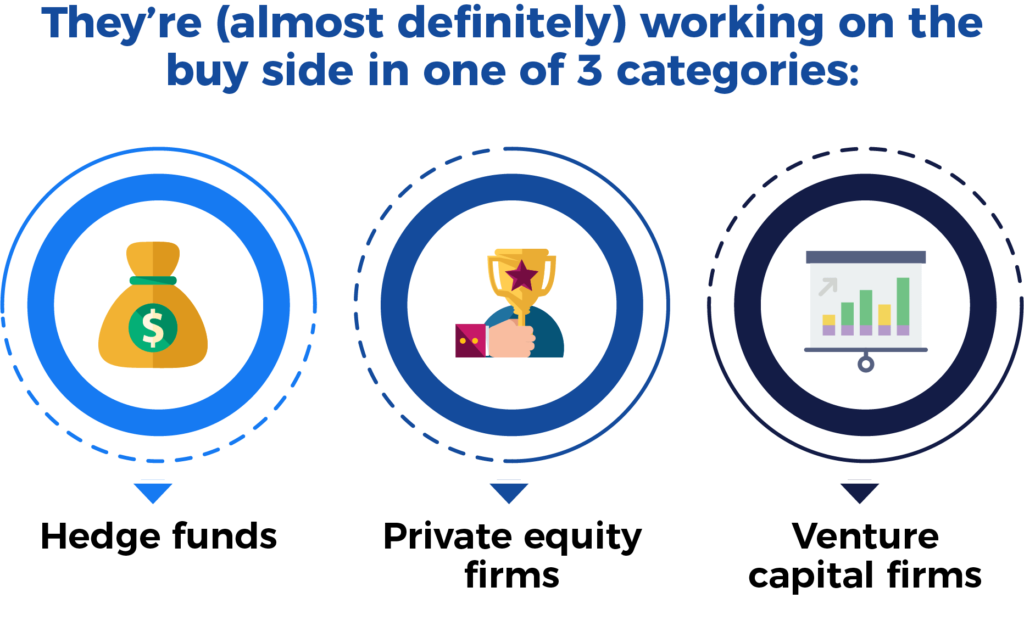
They?re (almost definitely) working on the buy side in one of 3 categories:
- Hedge funds
- Private equity firms
- Venture capital firms.
Jobs where you?re analyzing different companies and industries to invest in.
It?s a really interesting field with crazy-person pay and loads of notoriety. Starting out you?ll make $125K to $250K. But you?ll have to be a die hard student willing to put in everything it takes to get there. These cool investment type jobs are out there, but they?re hard to get.
Everyone wants them. Only a handful get them.

Conclusion
If you?re not in a position to land a buy side position straight out of college, take my advice and decide which finance career path is best for you, so that you can get there.
Best of luck, friends! Don?t forget to subscribe to my YouTube channel, so you can stay up to date on my newest videos.
Also, check out our website tier1wallstreet.com, where you can subscribe to our newsletter and receive access to tons of free material just like this.